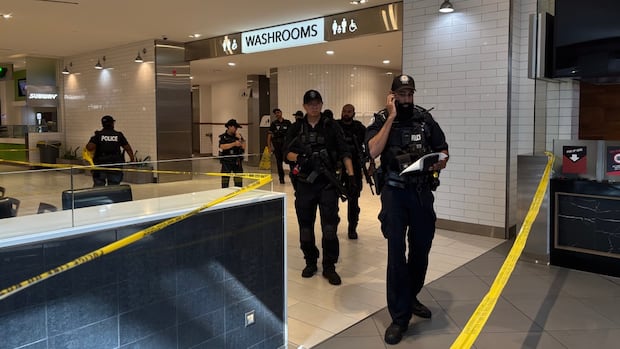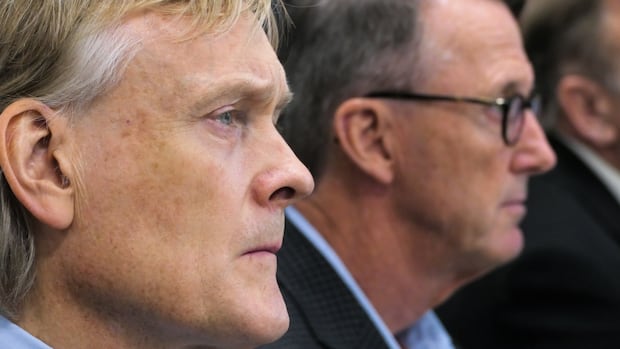Five Canadian premiers, including Ontario’s Doug Ford, are in Boston on Monday at the invitation of some northeastern U.S. governors to try to forge alliances against Donald Trump’s tariffs.
Ford is joined by fellow premiers Tim Houston of Nova Scotia, Susan Holt of New Brunswick, Rob Lantz of P.E.I. and John Hogan of Newfoundland and Labrador for a day of meetings at Massachusetts State House with the governors of seven states or their delegates.
Only one of the governors slated to attend is Republican — Vermont’s Phil Scott — so whether the gathering will hold any sway with Trump is an open question.
The governors and premiers will discuss the impacts of Trump’s tariffs and how U.S. and Canadian leaders “can continue to work together to maintain economic relations that benefit local businesses and residents,” according to a news release from the event’s host, Massachusetts Gov. Maura Healey, a Democrat.
They’ll start the day with closed-door talks focused on opportunities to collaborate on energy, trade, tourism and manufacturing, then open the door to news media to continue their discussions in front of the cameras.
“Premier Ford will advocate for his vision of Fortress Am-Can, a renewed strategic alliance that makes Canada and the U.S. the richest, most prosperous, safest, and most secure two countries on the planet,” said Ford’s spokesperson Hannah Jensen in a statement.
Houston says the meeting will help with the important relationships between premiers and governors but he admits the event is unlikely to shift Trump’s position on tariffs.
“That’s a president of the United States-level decision,” Houston told a Halifax news conference. “That doesn’t mean we can’t have positive relationships with governors and Americans in general. I think that’s just, that’s the goal.”
‘Recruit more allies’
Holt is putting forward a more optimistic view of what can be achieved by meeting with the governors.
“We would like to continue to encourage them to work through their channels and their business leaders to make clear to the administration how tariffs are hurting Americans and Canadians,” Holt told a news conference in Fredericton.
She said the goal is to “get those messages through to the people that we hope can influence the president” to drop his tariffs against Canada.
“We’re going to continue to try to build and manage the trade partnerships that matter to New Brunswickers and to New Brunswickers’ jobs, to continue to make sure that our goods are being purchased by the U.S. and that we continue to have access to what we need to grow our economy here while we recruit more allies in the fight against tariffs,” said Holt.
In an interview on Rosemary Barton Live, Maine Gov. Janet Mills says tariffs imposed by U.S. President Donald Trump on Canadian imports are “just a tax.” Mills says industries from construction to craft breweries are affected.
The governor of Maine, Janet Mills, says the reluctance of Canadians to cross the border is hurting tourism in her state and the tariffs are having an impact on various sectors of Maine’s economy, including agriculture, construction and breweries.
“I personally do not understand the rhetoric that’s coming out of Washington, out of the president’s mouth,” Mills told CBC’s Rosemary Barton Live on Sunday.
“We want the Canadian people to know … that we don’t share that hostility or that kind of rhetoric. We think it’s shameful. We want to repair any broken relationships,” Mills said.
Other governors slated to attend are New York’s Kathy Hochul and Rhode Island’s Dan McKee, both Democrats.
New Hampshire’s Republican governor won’t attend
The Republican governor of New Hampshire, Kelly Ayotte, and the Democratic governor of Connecticut, Ned Lamont, will send representatives, according to a news release from the organizers.
Ayotte is the only governor in the region who did not sign the letter inviting the premiers to the event. She backed Trump’s presidential campaign in 2024, when she was running for governor.

Daniel Schwanen, vice president of the C.D. Howe Institute, a Toronto-based think tank, says governors from both parties know that jobs and economic activity in their states will be negatively affected by a trade war with Canada and that makes them natural allies of the premiers.
“There’s enormous value in having a U.S.-based constituency that agrees with Canada’s case that tariffs are mutually hurtful,” said Schwanen in an interview.
“The economic realities on the ground are in fact not really very different, regardless of whether your governor is a Democrat or a Republican,” he said.
Quebec Premier Francois Legault was invited to the Boston meeting but will send a cabinet minister in his place.
Ford has made three trips to Washington, D.C. so far this year and numerous appearances on U.S. news outlets to try to persuade Americans that tariffs hurt the economy south of the border.
While the premiers are in Boston, Trump is in Canada, attending the G7 summit in Alberta, a high-stakes meeting for all leaders but particularly so for Prime Minister Mark Carney.






